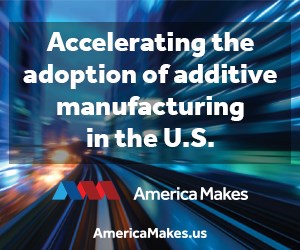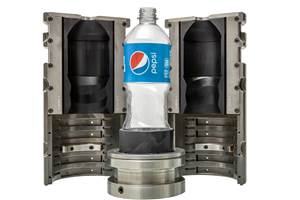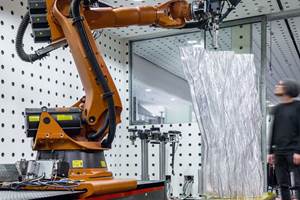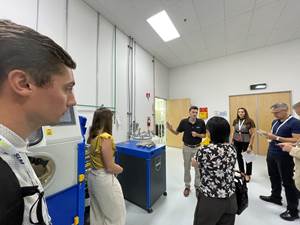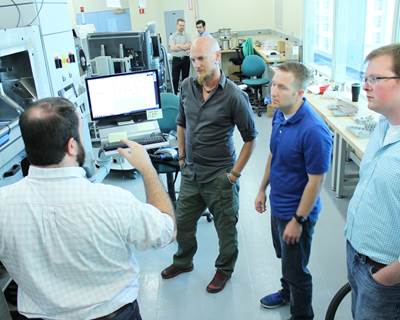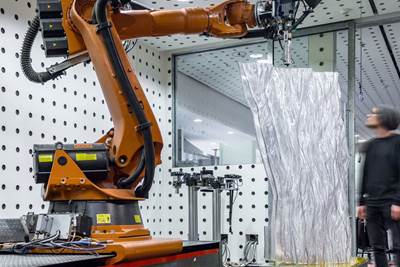3D Printer Manufacturer Now Offers Bio-Based, Recyclable Printing Materials
This collaboration gives customers a highly efficient process that eliminates production waste, minimizes energy consumption and enables flexible, localized, on-demand production with a smaller environmental footprint.
Share
Read Next
The Industry, a Finnish manufacturer of large-scale 3D printers, is now offering the patented bio-based and recyclable Sulapac materials for its customers. This partnership is said to empower businesses to make a positive impact on the environment while boosting efficiency and exceeding customer expectations.
The collaboration between the Helsinki-based material innovation company Sulapac and the Swedish 3D printing expert The Industry opens up new avenues for circular economy and climate action. It brings together cutting-edge expertise in biomaterial development and industrial engineering with shared values of innovation, sustainability and quality.
Manufacturing with The Industry’s next-generation 3D printers is a highly efficient process that eliminates production waste, minimizes energy consumption and enables flexible, localized, on-demand production. Choosing sustainable Sulapac as the printing material over conventional plastic lowers customers’ environmental footprint even further.
Made of biodegradable biopolymers and sustainable fillers such as wood from industrial sidestreams, Sulapac materials have a low carbon footprint. They are safe for people and the planet throughout the life cycle with zero persistent microplastics or toxic substances left behind. Also, Sulapac materials are recyclable by design and can be made with recycled content.
In addition to requirements for environmental responsibility, the materials selected for The Industry’s material library must fulfill strictly defined technical criteria. Sulapac Flow 1.7, a beautiful wood- composite, and Sulapac Universal Heat 30, a bio-based material with good heat endurance and ability to stand high pressure, have performed extremely well in comprehensive testing conducted by The Industry, both in terms of mechanical properties and processability.
“We are very proud of our partnership with Sulapac due to the exceptional quality of their materials and their seamless compatibility with our MAGNUM printer,” says Jonas Carlsson, CEO of The Industry Sweden. “As we always strive to give the best to our customers. We truly believe that materials like Sulapac will have a strong positive impact on sustainable global production.
“In our experience, modern businesses are constantly searching for new materials that can convey a premium look and feel,” Carlsson adds. “After running multiple tests on our MAGNUM printer, we can say without a doubt that Sulapac managed to live up to the expectations and we can only foresee a positive increase in demand for their materials across various industries working with additive manufacturing technologies.”
Sulapac Flow 1.7 and Universal Heat 30, both food-contact compliant and industrially compostable certified, are now among the recommended feedstock materials for MAGNUM printers, The
Industry’s spearhead product. Companies can also order products printed from Sulapac.
Sulapac can be used in 3D printed furniture, prototypes, machine parts and design items, and more. Sulapac Universal Heat finds additional applications, including industrial molds for die casting, cement casting, die molding and pressure molding.
“Thanks to the cooperation with The Industry, we have started to discover the variety of possibilities for Sulapac materials in 3D printing,” says Emmi Randell, Sulapac head of business development. “Their technical fit and unparalleled sustainability features combined with the many benefits of 3D printing offer endless opportunities for companies willing to lead the way towards a cleaner future.”
Related Content
How Hybrid Tooling — Part 3D Printed, Part Metal Shell — Accelerates Product Development and Sustainability for PepsiCo
The consumer products giant used to wait weeks and spend thousands on each iteration of a prototype blow mold. Now, new blow molds are available in days and cost just a few hundred dollars.
Read MoreAdditive Wins on Cost, Plus Process Monitoring and More from RAPID + TCT 2023: AM Radio #38
Additive manufacturing is finding success as a cost-effective manufacturing method. New options for process monitoring are now available. DED is getting more precise. 3D printed chairs! What we learned and observed at RAPID + TCT 2023.
Read More3D Printing Brings Sustainability, Accessibility to Glass Manufacturing
Australian startup Maple Glass Printing has developed a process for extruding glass into artwork, lab implements and architectural elements. Along the way, the company has also found more efficient ways of recycling this material.
Read MoreThe AM Ecosystem, User Journeys and More from Formnext Forum Austin: AM Radio #43
Sessions and conversations at the first U.S. Formnext event highlighted the complete additive manufacturing ecosystem, sustainability, the importance of customer education, AM user journeys and much more.
Read MoreRead Next
4 Ways the Education and Training Challenge Is Different for Additive Manufacturing
The advance of additive manufacturing means we need more professionals educated in AM technology.
Read More3D Printing Brings Sustainability, Accessibility to Glass Manufacturing
Australian startup Maple Glass Printing has developed a process for extruding glass into artwork, lab implements and architectural elements. Along the way, the company has also found more efficient ways of recycling this material.
Read MoreAt General Atomics, Do Unmanned Aerial Systems Reveal the Future of Aircraft Manufacturing?
The maker of the Predator and SkyGuardian remote aircraft can implement additive manufacturing more rapidly and widely than the makers of other types of planes. The role of 3D printing in current and future UAS components hints at how far AM can go to save cost and time in aircraft production and design.
Read More

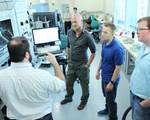


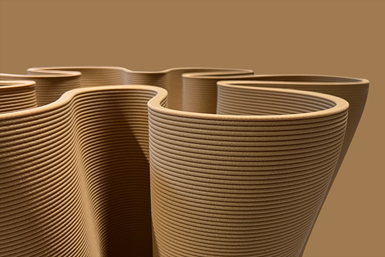

.png;maxWidth=300;quality=90)



